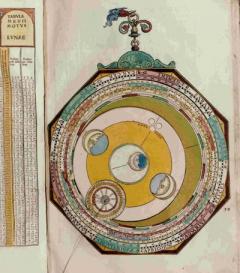History of Science, Medicine and Technology Research Group
The History of Science, Medicine and Technology Research Group (HSMT-Ed) is an interdisciplinary research group based in the School of History, Classics and Archaeology at the University of Edinburgh.

HSMT-Ed is an interdisciplinary research group based in the School of History, Classics and Archaeology at the University of Edinburgh. We bring together academics, doctoral students and post-doctoral researchers from across the College of Arts, Humanities and Social Science who share an interest in the history of medicine, science and technology from antiquity to the present.
Research areas
We encourage exchange between academics across the humanities/science. Our work has been funded by the AHRC, Carnegie Trust, Leverhulme Trust, and Wellcome Trust. A number of projects by members of the group reflect this attention to cross-disciplinary collaboration:
- Mathematical Humanities: Antiquarian Roots of the Enlightenment University – funded by the Carnegie Trust (Dr Richard Oosterhoff)
- Modelling the Construction of the Water Supply of Constantinople – funded by the Leverhulme Trust (Prof. Jim Crow)
- The Abortion Act (1967): A Biography – funded by the AHRC (Dr Gayle Davis)
Seminars
This research group organises a seminar series about the history of science, medicine and technology. You can find the programme for this year on the HSMT group seminar page.
HSMT-Ed combines Edinburgh’s remarkable history and unique resources with world-leading research in the fields of medicine, science and technology. Geographically, we span the globe from East to West, with a focus on Europe. Thematically, our members’ expertise includes: the history of sexuality and the body from the Middle Ages to modern times, the history of modern psychiatry both in the East and in the West, the history of epidemics and natural disasters and related emotional responses, the history of distributed cognition, the history and philosophy of biology, medieval to modern pharmacology and medicine, the history of public health and administration, veterans’ health during WWII, popular and learned healing practices from Anglo-Saxon times to the Renaissance, the history of astrology and astronomy, the Scientific Revolution, Newtonianism and the Enlightenment, Renaissance to modern mathematical culture, British 18th- and 19th-century medical professions, collecting and life writing, and late Antique and early Byzantine engineering. Our wide range of specialisms is unique in Scotland and provides the basis for lively and mutually beneficial exchange within and beyond the academy.
Membership
We're always looking for more members and participants! To be added to the HSMT-Ed email listserv for updates on events, please subscribe here or contact one of the group Co-ordinators.
Co-ordinators
- Zubin Mistry (School of History, Classics and Archaeology)
- Richard Oosterhoff (School of History, Classics and Archaeology)
- Petros Bouras-Vaillanatos (School of History, Classics and Archaeology - Wellcome Lecturer in History of Medicine)
Staff members (School of History, Classics and Archaeology)
- Dr Bill Aird
- Dr Miranda Anderson
- Dr Thomas Ahnert
- Dr Petros Bouras-Vaillanatos
- Dr Emily Brownell
- Professor Douglas Cairns
- Professor Jim Crow
- Dr Gayle Davis
- Dr Linda Fibiger
- Dr Julie Gibbings
- Dr Julian Goodare
- Dr Chris Harding
- Dr Kathleen McSweeney
- Professor Stana Nenadic
- Professor Richard Rodger
- Dr Richard Sowerby
- Dr Justyna Aniceta Turkowska
Staff members (School of Social and Political Science)
- Dr Michael Barany
- Dr Lawrence Dritsas
- Dr Lukas Engelmann
- Dr Miguel Garcia-Sancho
- Professor Steven Sturdy
- Dr Niki Vermeulen
Staff members (School of Philosophy, Psychology and Language Science)
Honorary and emeritus
- Professor Sam Cohn
- Professor John Henry
PhD Students
We also have PhD student members from History, Classics and Archaeology:
- Lewis Ashman – 'Newtonianism in Enlightenment Scotland'
- Axelle Champion – 'Child and adolescent psychiatry in France and Scotland, c.1870-1914’
- Edward Fellows – 'Natural theology in Early Modern Britain'
- Jane O'Neill – 'Youth, sexuality and courtship in Scotland, 1945-80'
- Barbara Haward – 'Telegrapher's cramp: Tthe first modern office disease'
- Michal Adam Palacz – 'The Polish School of Medicine at the University of Edinburgh (1941-1949): A case study in the transnational history of Polish wartime migration to Great Britain'
- Martha McGill – 'Ghosts in Enlightenment Scotland'
- Indigo Reeve – 'Morbidity and mortality of the medieval and post-medieval populations of London and Scotland in relation to their environment'
- René Winkler – 'Robert Sibbald and the Origins of Museums in Scotland'
- Masayuki Fukushima - 'Acute Diseases in the Corpus Hippocraticum and after'

